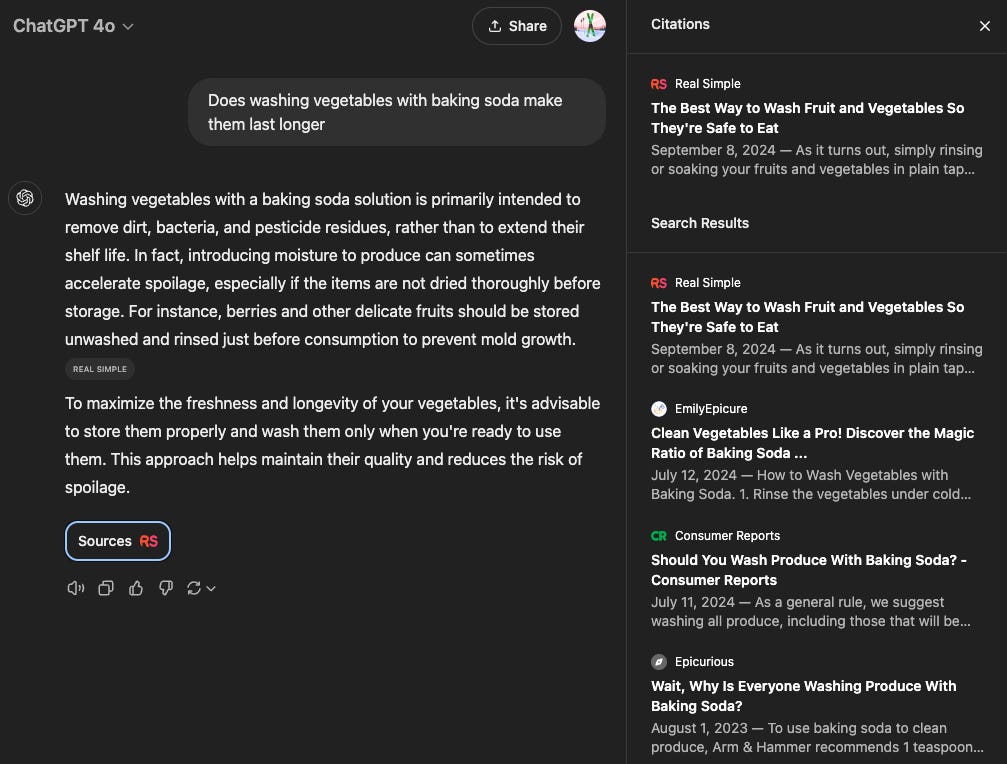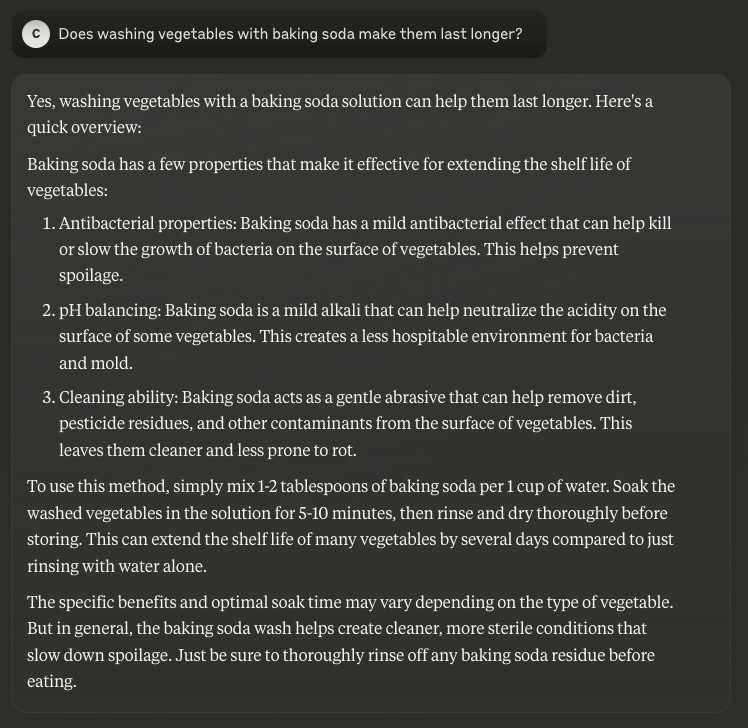Forget Your URL Bar, Search With AI
If you can, that is. The URL bar is the default experience that everyone understands.
The Teardown
Thursday :: November 7th, 2024 :: Approx. 8 min read
👋 Hi, this is Chris with another issue of The Teardown. In every issue, I cover how we interact with technology that powers our day-to-day lives.
Subscribe below to get an email like this next week.
And, if you enjoy this post, let me know by tapping the Like (❤️) icon or forwarding the email to someone awesome.
Basic Default Behaviors
Like many of you, I voted on Tuesday morning.
I sent two friends a message as I walked away: I’m voting, they don’t require ID … it’s odd to walk in and not bother that check. Excuse my tapping illiteracy.
Those friends and I expanded on the point. How do they (election workers) know it’s you? Note: this isn’t a post about the reasons for or against ID verification. Use Google, or not, as you’ll see.
New York State (where I live) doesn’t require that you verify who you are with a physical ID. County election workers match your signature (on file) with the signature you scribble to receive the paper ballot.
You provide your signature when you register to vote. And New York imposes minimum registration requirements on residents. I realized during my walk that I didn’t remember those requirements.
Federal ID? Blood? Firstborn donation? No memory.
So, I opened my phone browser, tapped my question, and asked the internet to opine. Nothing out of the ordinary. The browser illuminated several Google results and Google’s newer AI-generated answers.
Later that day, I spoke with a good friend about the performance of a specific private insurance company relative to the industry.
I heard about company “outperformance” during an intro call, and wanted to confirm that statement with an external data point. Speaking with an informed friend seemed like the right path.
My friend didn’t know much but suggested that we ask Claude. And, I assumed he had some industry Frenchman on-call to sort questions like mine.
Did he resort to an on-call resource? Yes. But not a human titan of industry. He was talking about Claude - the AI model and bot from Anthropic.
I hadn’t considered Claude or reached for another similar friend: ChatGPT Search. Perplexity also wasn’t high on my list of go-to resources. None of the three overrode using Google Search, via my phone’s URL bar or field.
The URL bar is the internet’s most sacred real estate. More than Google’s Search box. More than any other specific app or website. Why? Well, it’s there. Hard to miss. You visit a website or search any term or phrase from the URL bar. Stowed in your pocket or purse.
You’ve searched countless times via the URL bar and forgotten about other alternatives over the years. Most people don’t use Bing or DuckDuckGo on purpose. Most people don’t open a separate Google app to search Google.
And, so, the URL bar is your default starting point. Defaults - especially those without much friction - don’t dislodge without lots of effort.
But the internet today is fracturing in a fascinating manner. More than ever, you don’t need Google. Let’s dig into what’s happening.
TikTok
I won’t dive deep into TikTok but understand why it works. You like watching videos. If or when you want to signal that interest, you like or save those videos.
But your viewing behavior is the key unlock. You’re not interested in a video that you almost immediately swipe away. The contrast is a video you watch in full, repeatedly, not only in one day but over long stretches of time. Days.Weeks.
TikTok’s algorithms understand what videos best hold your attention and deliver more of them to you. In short order, you’re watching videos optimized for your watching habits and, by extension, interests.
It’s not hard to see how Tiktok becomes primary information for many people. TikTok becomes the truth.
I recently stumbled into this reality while talking with a friend about produce. I know you want to be a fly on the wall next to that enthralling conversation.
He prepares his week’s basket of vegetables and fruit by washing them in a solution of baking soda and water. I understood that this process cleaned them, but also heard that these perishable goodies lasted longer because of baking soda.
The internet didn’t convince me that the second point (longevity) was true. Not one site suggested that my produce would last longer. So, I asked my friend:
Liam your vegetable/fruit washing: is your system of drying, organizing, storing correctly the reason things last longer, or did you find something that confirms that baking soda washing boosts shelf-life?
He sent me a TikTok link in his response.
The answer? Well, the video said nothing about baking soda’s rumored life-extending abilities. I wasn’t sure whether I had misheard him or not.
And I looked for another opinion, something I am well trained to do in a heightened era stuffed with poor quality information.
How?
ChatGPT Search, Claude, and Perplexity AI.
ChatGPT o1 / ChatGPT Search (4o)
I used two products from OpenAI’s product suite: ChatGPT 4o (with Search), and ChatGPT o1-Preview. The latter reasons somewhat like a human, a bump in complexity and intrigue over 4o.
OpenAI recently introduced Search inside the chat interface, tied to the 4o model. Search provides, well, search functionality on top of 4o’s predictive retorts. You type a search query like you might to Google and receive an answer.
The two models supported their answers in different ways. 4o, boosted by Search, provided an answer and cited sources. o1 behaved as expected, thinking about and providing a succinct bulleted answer. No sources cited. Higher IQ than you, mere human!
o1 was convincing too, providing what felt like a researched answer. 4o stopped short of analysis and instead closed its short response with a source link to the magazine Real Simple. Have a look:
Is Real Simple a reputable source? I don’t know! Is it better than the TikTok video? Unclear.
But neither product returned this answer: baking soda increases longevity. In fact, both products suggested the opposite was possible. Keep that conclusion in mind.
Claude
The Frenchman was in fact a chat bot, not a person. Claude, A/S/L?
I sent Claude the same question: Does washing vegetables with baking soda make them last longer?
Claude’s response looked like OpenAI’s. The bot summarized and provided clean organized bullets in its response. But Claude broke with its competitor, stating or suggesting that a baking soda wash extended the life of my precious produce.
Claude didn’t tell me why or how it derived its answer. That stopping point illuminated a problem in many earlier Large Language Models (LLMs): they didn’t trace back to source data, instead regurgitating predicted text.
So, I had two different AI-sourced answers in my hand. One more to go. Best of three.
Perplexity
I used my eloquent prompt for the third time: Does washing vegetables with baking soda make them last longer?
Perplexity’s founding idea differed from the others: conversational search. It used a homegrown LLM on top of a search index to respond to search-oriented prompts with up-to-date information. The use-case skipped Google altogether and relied on the company’s crawler and LLM prowess (free version, anyways).
The answer leaned closer in style and substance to OpenAI o1:
Washing vegetables with baking soda can effectively remove pesticides and contaminants, but it does not necessarily extend their shelf life. Here’s a detailed look at how this method works and its implications for food preservation.
The bot also provided a more functional answer compared to ChatGPT and Claude. I gained access to step-by-step washing instructions. The succinct section Impact on Shelf Life told me what I wanted to know about shelf stability.
I think the conclusion speaks for itself:
In summary, washing vegetables with baking soda is an effective method for reducing pesticide residues, but it does not extend their shelf life significantly. Proper drying and storage practices are crucial for maintaining freshness after washing.
Got it, PerplexiBuddy.
Habit Stranglehold
I’m now armed with a plethora of information about washing vegetables. Baking soda cleans them better than water alone. Learn how to store vegetables with care to boost their lives.
But I want to come back to the earlier theme: defaults.
Much of my research (or deep work) happens on a large computer display, a 4-year-old 34-inch curved Dell with endless spreadsheet work burned into its pixels. Two or three browser windows spread across my screen. I cross-reference several tabs in rapid succession.
A phone (I use an iPhone) is a different story. You can’t multitask across many windows without lots of swiping, and I type faster with a physical keyboard. So I choose the path of least resistance more than not.
I’ve punched questions, queries, and websites into the URL bar for years.
ChatGPT, Claude, and Perplexity are three separate apps in basic form.
So, to use any one of the three, I’m disconnecting from my well-oiled process to try something new. I’m breaking one habit with the goal of creating another. Maybe.
A week of phone use shows Safari in second place, behind WhatApp, and ahead of Substack:
I think this breakdown speaks to the inherent friction involved in changing defaults. The various LLM apps are easy to access but don’t supplant my browser bar in day-to-day thinking. You’d see them in the list if they did.
These models provide compelling easy-to-digest information. But let’s not forget the other company developing LLMs and providing search-enabled LLM answers: Google.
Typing my question into the URL bar produces the response below, a packaged answer that requires no separate app and lives right next to the other sites I’m browsing.
It’s still hard to overcome this default behavior. The URL still provides everything I need, keeping in mind that I can write an entire post or more on the quality and accuracy of results.







When I read the first bit of this I thought “it gets rid of pesticides” because it was something I learned in the 1900s 😂 I kept reading though because it’s interesting—about behaviour, our interactions with tech and how it shapes how we see the world. Thanks!